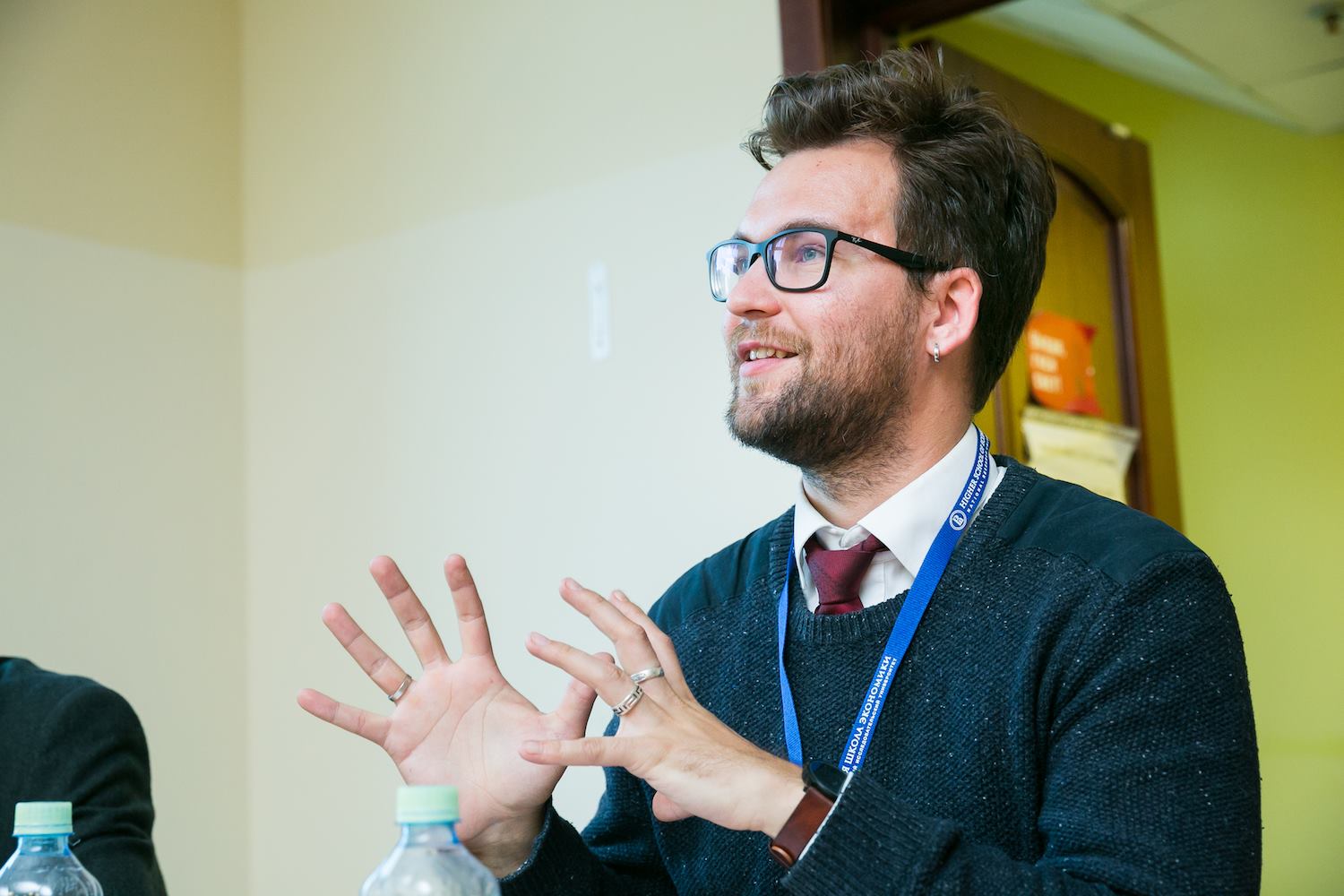How to Combine University Values with the H-Index

Experts at HSE University and other universities discussed what constitutes a university virtue and whether it is possible to assess scientific and scholarly accomplishments based solely on quantitative criteria. At the conference ‘University HR Policies: Managing Staff Involvement’, Aleksei Pleshkov, Director of the Poletaev Institute for Theoretical and Historical Studies in the Humanities at HSE University, gave a talk entitled ‘In Search of Academic Ethics: Goodness, Virtues and Happiness’.
Aleksei Pleshkov noted that in discussions pertaining academic ethics, questions of ethical violations are frequently raised, but the question of ethical integrity is less often examined. Moreover, the question of ethics itself at the practical level is often mixed with schedules and technical regulations. Any discipline seeks to reflect the object that it studies, but ethics itself forms the object of the study, and if the conversation about ethics is not sustained, its very existence is under threat. Ethics is not about abstract knowledge, but about the creation of practices.

Universities have created different traditions and histories, and no generalised model exists. It is important not to confuse academic and teaching ethics, since the former is organisational ethics and the latter is professional ethics, while institutional ethics and the ethics of the liberal profession can be both contradictory and overlapping.
Teachers may require students to observe scientific ethics, and administrators may call upon researchers to respect academic ethics. The author of the presentation noted that, against the backdrop of changing practices, we see a change in virtues: a person must do something well not in a moral sense, but in a professional way, which partly replaces the subject of discussion.
During the discussion of the presentation, Mikhail Sokolov, Professor of the Department of Sociology at the European University at St. Petersburg, noted that excessive enthusiasm for formal measures of work often hinders the researcher and requires transparency of criteria. Their widespread dissemination was a result of the lack of trust of the academic community in grant distribution procedures, competition evaluation practices, and flourishing favouritism.
An algorithm to track decision-making was required. A strict rule-based orthographic model of assessment helps to identify plagiarism, validate bibliographies, and check the accuracy of formulas, but it does not always show the scientific value and novelty of a work. It also often requires additional detailing of regulations. Also, abiding by formal rules may not indicate a researcher’s virtue, but rather their ability to play the system.
The rhetorical model, which primarily assesses novelty and scientific value, has its drawbacks. Its quality often depends on the integrity and ethics of experts. Where there was less favouritism and fewer obvious failures to identify winners and award grants, the credibility of the expertise is higher. Formal indicators to determine the quality of work play a dual role, as they often demonstrate the success of an informal attitude towards the works being checked, Mikhail Sokolov assumes.
Ivan Sterligov, Research Fellow of the Centre for Institutional Studies, HSE University, in his presentation ‘Virtues and Vices in the Era of Pragmatic Efficiency. The Publication Dimension’ noted that the general movement towards transparency and accountability reflects changes in state administration that influence education. When we talk about the effectiveness of research, attention is often focused on the requirements for researchers not only to disseminate knowledge but also to turn it into a commercial product. It is not simply scholarly publications that are expected of them, he explained.
In evaluating the work of a university professor, their reputation, the number of grants awarded, their number of students and postgraduate students, and the number of defences in which they have participated are all taken into account. Bibliometric indicators are identified separately. However, the metrics for universities become metrics for academics, which in Ivan Sterligov’s opinion, leads to a shift in their work objectives — many university research and teaching staff members say, ‘We used to be called research, now we’re publications’. It also leads to the predictability of studies of a large proportion of researchers, their desire to develop mainstream and more popular topics, and the curtailment of activities that do not yield points for current evaluations.
In Russia, the problems are compounded by the weakness and deficiency of the grant system, and the decorative nature of some of the goals and national projects, says Ivan Sterligov.
The weak development of technological transfer, technological innovation, and private research, in addition to the totalitarian nature of formal assessments and the excessive role of formalised premiums, create utter madness when it comes to ratings
At the same time, Russia has considerably less expertise, even with the involvement of foreign scholars, and in evaluating the activities of researchers there is no link to which the true quality of scholarly work is of crucial importance. This often leads researchers to adopt an unscrupulous approach. It is difficult to cultivate virtue when quality is assessed primarily according to formal criteria, the HSE University expert argued. To change the situation, he suggests that assessing not the number of publications in highly rated journals, but their scholarly value; it is important to remember that the aim of research is to find the truth and pay more attention to the professional expertise and reputation of the reviewers.
However, noted Ivan Sterligov, the current reliance on scientometrics seems to be the lesser evil when compared with the possibility of introducing a Finnish system, where journals are evaluated by experts. Such a system, the expert believes, will become important when current postgraduate students become professors.
Anna Zavaley, Head of the Educational Projects Coordination Unit of HSE’s eLearning Office, wondered what it means to be a good student and how to follow academic virtues when studying online. At one of the faculties, she said, there was a case of files being sent with blank sheets or quotes from poems, and there was collusion between the students to score mutual high marks. This was noticed by the assistant, and the students were ultimately reprimanded.
Some students then took to Telegram, writing, ‘That’s what everybody does, except for cut-throat “A” students.’ However, a study conducted by the eLearning Office showed that most students feel that cheating and quoting Shakespeare instead of answering is not the norm.
Anna Zavaley noted that problems of plagiarism and compliance with academic ethics have affected all universities during the pandemic. Following a request to the Coursera platform, HSE University received a response that the United States and England had similar plagiarism queries as other countries. According to Anna Zavaley, changing technologies should not change academic practice. At the same time, this process stimulates discussion on how we can promote academic virtues so that students understand that norms continue to apply.

Ivan Gruzdev, Director for Internal Monitoring and Student Academic Development, explained how scholarly productivity and teaching quality are linked. The question of whether it is possible to be both a good researcher and a teacher is not rhetorical. There are different approaches: some consider it impossible or extremely difficult to combine teaching with intensive research, others say they cannot teach well if they do not feel they are at the forefront of research. In favour of a negative link, Ivan Gruzdev believes, scarcity is a factor, being busy with research and preparing for lectures and seminars compete for the same time and effort; besides, teachers and researchers have different psychological features.
The study took into account citation indices, publication activity, and student assessments of teachers. Ivan Gruzdev reported that the results showed: no significant correlation between the h-index and students’ grades, even slightly negative. However, there is some positive impact at the Master’s programme, where the teacher interacts more closely with the students. This effect is more evident in the humanities and social sciences than in the natural and exact sciences.
Ivan Sterligov noted that the h-index is not recommended for assessing emerging scholars. It is also incorrect when the number of publications is divided by the number of authors; in this case it is not advantageous for the teacher to involve students as co-authors. Aleksei Pleshkov concluded that virtue does not equal efficiency. To have virtue means to follow it all the way down to the smallest detail. He is convinced that academic virtue is not at odds with the traditional categories of education philosophy, but attacks the desire to be a parasite on academic rhetoric. Academic ethics cannot always be reduced to the adoption of a code of ethics; it is not only technical solutions, but also an ongoing discussion of ethics and ethical issues.

